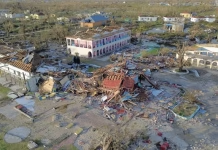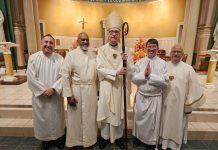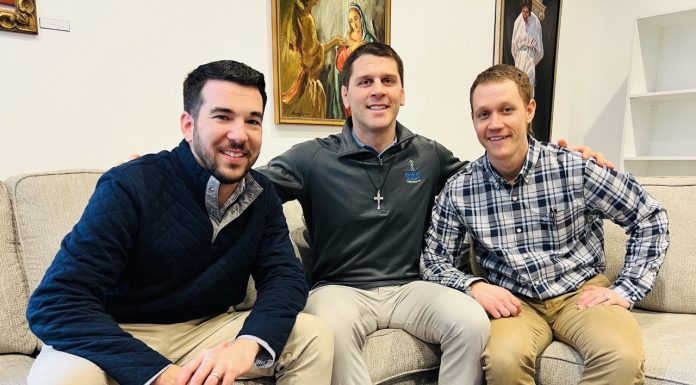Column by Jonathan Nagy
The 1946 Frank Capra classic movie, “It’s a Wonderful Life,” examines the life of Jimmy Stewart’s character George Bailey. A man with great dreams and aspirations, George suffers setback after setback in his life, derailing his lofty goals. Along the way, George creates quite a life for himself in Bedford Falls, taking over the family business, raising a family, reconstructing a beautiful home, and assisting in bringing the town through the Great Depression and World War II. However, none of these things were part of his plans. Early in the movie, George said, “I know what I’m gonna do tomorrow, and the next day, and next year, and the year after that.” None of those plans came true, and on Christmas Eve, George was left in a terrible financial mess. Unsure of what to do, George prays for help and when on the verge of taking his own life, God sends a guardian angel to George, who not only saves his life, but gives him the great gift of seeing what the world would have been like had he never been born. Clarence, the guardian angel, said to George after the review of life without him, “Strange, isn’t it? Each man’s life touches so many other lives. And when he isn’t around he leaves an awful hole, doesn’t he? You see George, you really had a wonderful life. Don’t you see what a mistake it would be to throw it away?” After this experience, George reflects and realizes that what Clarence said was true. In one of the most heartwarming moments in cinematic history, the town that George gave so much to came together to help him in his time of need. George realized that he indeed had a wonderful life.
This movie has always been a personal favorite of mine for many reasons. First, I have great memories of watching this film with my beloved grandfather, a simple man who also gave everything that he had to help others. My grandfather could have been George Bailey for all that he did for his family, country, church, and community. Secondly, I find George Bailey to be a very relatable character. As a young child, I had large dreams that took me far away from here. Those plans that I had were not God’s plans, for He had a different purpose for me, and I am grateful for all God has done in my life. Thirdly, this movie can be applied to our very own Father Demetrius Gallitzin and the life from which he turned away in order to have the life God intended for him.
That last thought leads to the speculative question, “Where would Catholicism in America be if Demetrius Gallitzin had never been born? “
To answer simply, things would be vastly different. I would venture to say that outside of a few major east coast cities such as Baltimore and Boston, no place in America is as important to the spread of Catholicism than Loretto. This is all possible because Demetrius Gallitzin gave up his life as a noble in Europe to evangelize in the Allegheny Mountains.
Demetrius Gallitzin could have had any life that he wanted. Born wealthy with Russian and Prussian nobility and Empress Catherine the Great as his godmother, he could have had any military or political post that he wanted. The family name was as well-known around the world then as names like Clinton, Trump, and Obama are today. His loving mother, longing for a different kind of life for her son, convinced her husband to let him go on an educational tour of the United States. Paired up on the transatlantic crossing with Father Brosius, Gallitzin became intrigued by the Catholic faith that he was baptized under in secret and forbidden to publicly practice. For a long while, he hid his identity, changing his name to Smith, not out of shame for who he was, but to humble himself so that he could do God’s work without the assumptions of others. From his ordination until his death, Demetrius Gallitzin never again led that privileged life. He struggled emotionally, physically, financially, spiritually, and psychologically. Every time he seemed to make progress, something came along to create a setback. His years in Loretto were anything but easy, yet he never gave up, pushing forward as a soldier of Christ. Constantly defending the faith and his own life, he never cowered in the face of adversity, choosing instead to face it head on without reserve. A stern but loving man, Gallitzin understood the purpose for which God intended for him, and until his dying day, fulfilled that purpose admirably.
I would imagine that just like George Bailey, there were times that Demetrius Gallitzin questioned whether or not this was all worth it. Being cut off from his family, losing his inheritance, constantly challenged by non-believers, facing debtor’s prison, and suffering some severe medical issues would have been enough for many to decide it was not worth it. Thankfully for all of us, Demetrius Gallitzin believed that it was worth it.
Aside from baptizing thousands of people, celebrating thousands of Masses and hearing thousands of confessions, Father Gallitzin established several parishes. At one point, he was the only priest in western Pennsylvania and beyond. He traveled everywhere to meet the needs of the faithful, and eventually was given the assistance of several other priests to handle the parishes established in Ebensburg, Newry, Bedford, Wilmore, and Carrolltown, among others. His writings explaining and defending the faith that he fell in love with have become staples in American Catholic Apologetics. He used every dime that he had to build up his community of Loretto as a place for Catholicism to grow and prosper. Furthermore, the impact that Demetrius Gallitzin had did not end with his death.
Because of the legacy, the Franciscan Third Order Regulars came to Loretto to establish what was then Saint Francis College, the Sisters of Mercy created Mount Aloysius College as well as an orphanage, Charles Schwab built an empire, from which Loretto greatly benefitted, and a Carmelite Monastery was established in the town.
As the first man to receive all of his Holy Orders in America, Demetrius Gallitzin has become a role model to many in the priesthood. Because of his direct work with the people, many young men became priests, continuing on the purpose for which he came. Art is devoted to him in many historic churches, including the Basilica of the National Shrine of the Immaculate Conception in Washington, DC. Not far from Loretto, a town and a state park bear his name. Dozens of books have been written about his life and his work as a missionary Catholic priest in the wilderness of Pennsylvania. He is discussed frequently on Catholic radio and television programs. Pilgrimage after pilgrimage is made to Loretto, with one of the most memorable in recent history being the National Eucharistic Pilgrimage this past June. His current status as Servant of God reflects that the Catholic Church acknowledges his significant contributions to evangelizing God’s people. On top of everything else, we cannot even begin to count how many prayers have been answered due to his intercession with our Lord!
None of the things listed above would have happened without Demetrius Gallitzin. As Clarence said in “It’s a Wonderful Life,” “Each man touches so many other lives.” Yes, the thousands of people who actually met Father Gallitzin while they were alive were impacted greatly by his ministry, but there are literally millions of people who have benefitted from that ministry over the last few centuries. How amazing it is that one man, divinely placed here by God Almighty, could be so influential to so many!
It is important to note that of the thousands of letters that Father Gallitzin wrote in his lifetime, he signed the vast majority with “Your humble servant.” It did not matter to him if he was writing to a Bishop, a Catholic, or a non-believer. He believed he was sent here to serve and serve he did. I doubt that young “Mitri” in his studies in Europe would ever imagine what his life would become, a life for which we all need to be forever grateful.
As we approach All Saints Day, and later the 225th anniversary of the founding of Loretto and Father Gallitzin’s parish, Saint Michael the Archangel, we pray for the continuation of his Sainthood Cause. We pray that we may one day see the Canonization of this man, who truly led a wonderful life, and count him as one of the named saints in Heaven.
I leave you with the words given by Lawrence Cardinal Shehan, Archbishop of Baltimore, in a homily given in Loretto in 1970 to mark the bicentennial celebration of the birth of Demetrius Gallitzin. Cardinal Shehan said, “O happy Prince, who gave up parents and friends and rank and all earthly possessions to serve the Prince of Peace and King of Kings! O Happy priest, who from the day of ordination to the day of death spent a life completely dedicated to priestly pastoral work and the love of the great High Priest! O happy you, Bishop, priests, and people of the diocese who have inherited from the founder of your local Church and have faithfully preserved such a tradition of faith and loyalty and Christian love!”
Jonathan Nagy, M.Ed., is the Dean of Students, Director of Alumni Relations, and Social Studies teacher at Bishop Carroll Catholic High School in Ebensburg. He is also the Music Director at the Basilica of Saint Michael the Archangel in Loretto.































